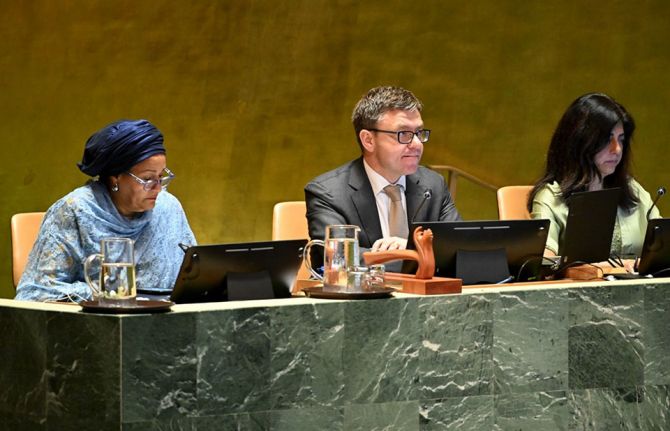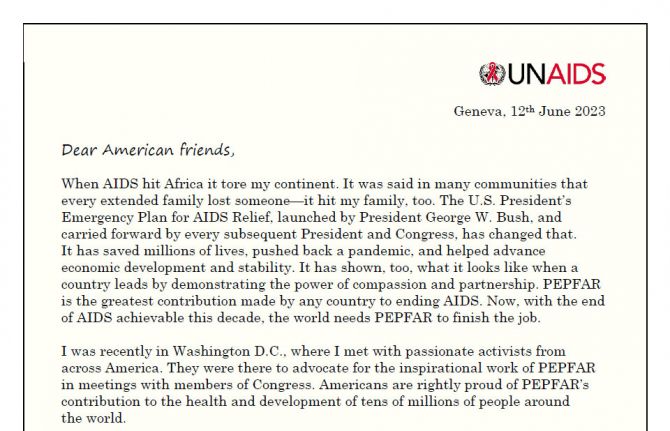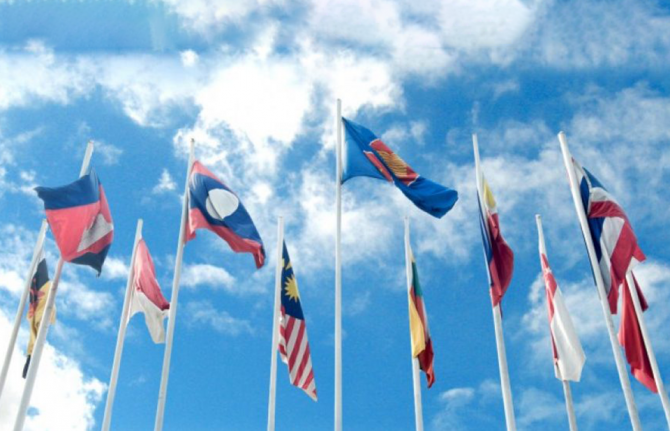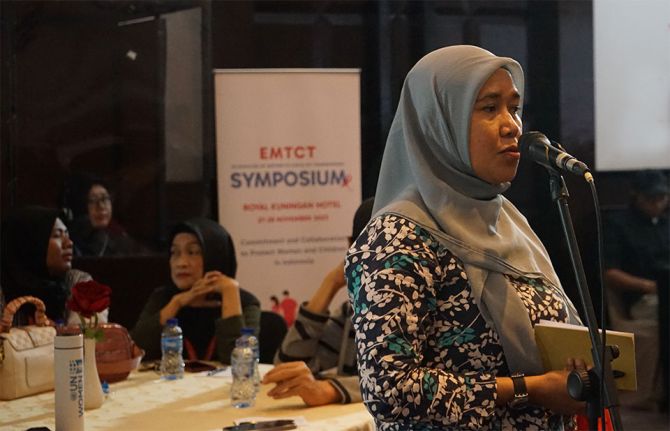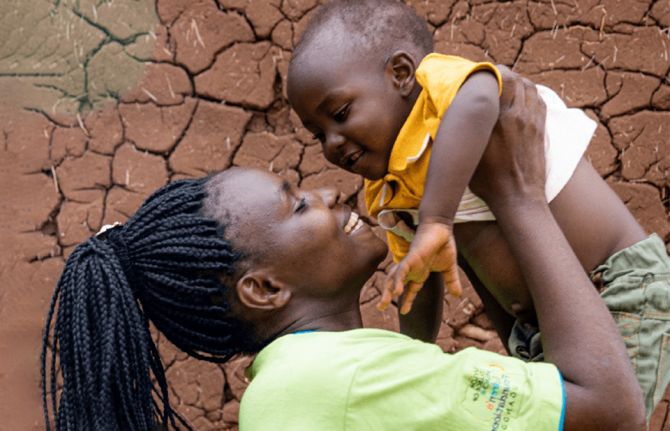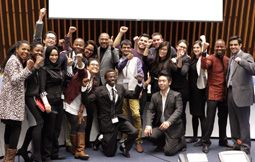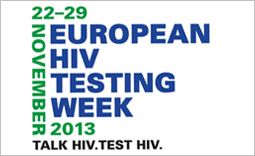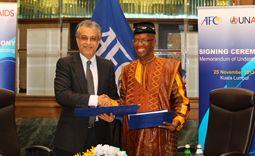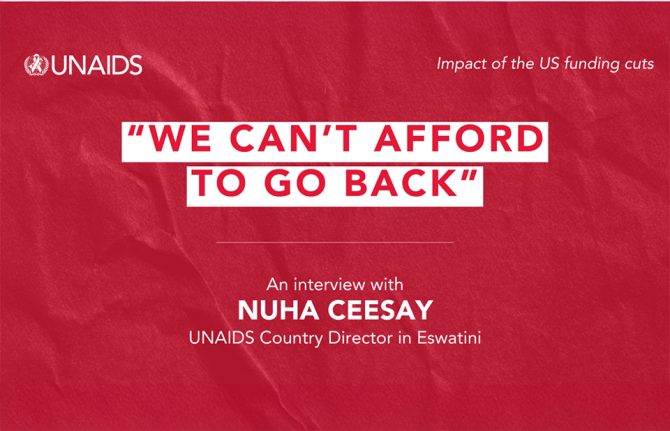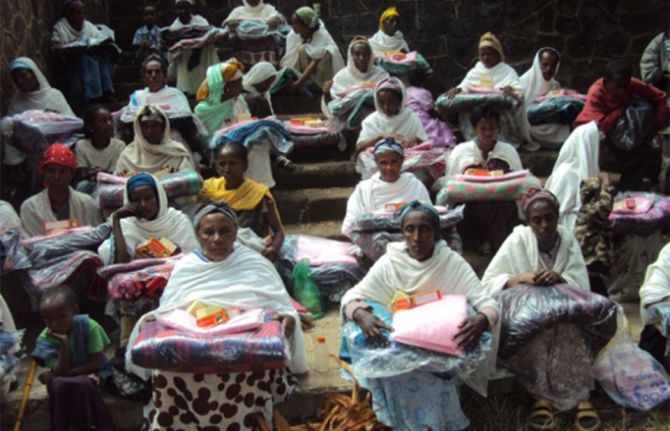
Feature Story
Jeux de la Francophonie and UNAIDS: Partnering for young people
28 September 2009
28 September 2009 28 September 2009
Jeux de la Francophonie opened in Beirut. Credit: UNAIDS/Nabil
The Jeux de la Francophonie (the Francophone Games) have been opened in Beirut by His Excellency Michel Suleiman, the President of Lebanon. The Jeux de la Francophonie is an event where sport and culture combine to foster dialogue and understanding among French speaking nations. The games are organized by a national organizing committee and the l’Organisation Internationale de la Francophonie (OIF).
Through partnership change can happen.
I am delighted that this year for the first time, UNAIDS is an official partner to the Jeux de la Francophonie
Michel Sidibé, UNAIDS Executive Director
“Through partnership change can happen,” said Mr Michel Sidibé, Executive Director of UNAIDS. “I am delighted that this year for the first time, UNAIDS is an official partner to the Jeux de la Francophonie. The OIF has shown leadership and a strong commitment to placing AIDS on the games’ agenda.”

Abdou Diouf, Secretary-General of La Francophonie addresses the opening ceremony
Credit: UNAIDS/Nabil
Observing the opening ceremony, Mr Sidibé noted the ability of the event to unify people all over the world. “The games, with their unique approach of merging sport and culture, have created a space for the open and respectful dialogue needed to challenge the taboos often surrounding issues pertaining to AIDS,” said Mr Sidibé.
Empowering young people to protect themselves from HIV is one of UNAIDS nine priority areas in the Outcome Framework 2009-2011.
In the Jeux de la Francophonie young athletes and artists of the French-speaking world are given an opportunity to meet through sporting and cultural events. The games have an ambition to foster dialogue and understanding among participants as well as spectators. It also aims to encourage young athletes and artist to contributing to international solidarity and gender equality, as well develop artistic exchanges between francophone countries.
"La Francophonie contre le sida - Francophone countries against AIDS"

Across the city of Beirut UNAIDS Goodwill Ambassadors Michael Ballack and Emmanuel Adebayor feature on 100 billboards with the powerful message “La Francophonie contre le sida” (Francophone countries against AIDS).
Credit: UNAIDS
In a joint campaign, across the city of Beirut UNAIDS Goodwill Ambassadors Michael Ballack and Emmanuel Adebayor feature on 100 billboards with the powerful message “La Francophonie contre le sida” (Francophone countries against AIDS). The UNAIDS logo along with other partners to the Games, is displayed by the organizing committee within the Chamoun stadium, visible to an expected 200, 000 spectators and 50 million people following the games via broadcasting.
Through the partnership, UNAIDS aims to raise awareness on AIDS issues and to help inform young people how to protect themselves against HIV infection.
With 7,400 new HIV infections daily worldwide and young people aged 15-24 accounting for 45% of these, empowering young people and raising awareness of the epidemic is seen as a key to bring about change.
Running from the 27 September to 6 October, the Jeux de la Francophonie brings together 70 countries from all over the world.
Jeux de la Francophonie and UNAIDS: Partnering fo
Cosponsors:
Partners:
L’Organisation internationale de la Francophonie (OIF)
Les Jeux de la Francophonie
Feature stories:
Peer educators raising HIV awareness through sport in Trinidad and Tobago (03 June 2009)
Publications:
Together for HIV & AIDS Prevention: a toolkit for the sports community (pdf, 4.81 Mb.)
Joint action for results: UNAIDS outcome framework, 2009 – 2011 (pdf, 388 Kb.)
Related
 “Who will protect our young people?”
“Who will protect our young people?”

02 June 2025

Feature Story
UNAIDS partners in new Clinton Global Initiative to address sexual violence against girls
25 September 2009
25 September 2009 25 September 2009
UNAIDS and cosponsors UNICEF, UNFPA and WHO have joined the Centers for Disease Control and Prevention, UNIFEM and private sector supporters through the Clinton Global Initiative to address the injustices and health impact of sexual violence against girls. The initiative, launched in New York by the partners, will focus on countries where sexual violence is a key initiation point for the spread of HIV and other infectious diseases.
Partners of the initiative will come together to conduct research in seven countries using the methodology piloted in Swaziland in 2007 by UNICEF and the Centers for Disease Control and Prevention (CDC).
In collaboration with World Health Organization, UNICEF and CDC will use the survey results to develop a technical package of policy and social interventions, tailored individually for the countries in southern Africa, Asia and the Pacific regions.
“While it is generally known that sexual violence against girls is a global problem, very limited data exist on the extent of this problem in the developing world. Obtaining valid data is a key step toward mobilizing policy and other positive interventions,” said Dr. Rodney Hammond, Director of the Division of Violence Prevention in CDC’s Injury Center.
“Sexual violence against children is a gross violation of their rights, a moral and ethical outrage and an assault on the world’s conscience,” said Ann M. Veneman, Executive Director of UNICEF. “Sexual abuse can lead to lost childhoods, abandoned education, physical and emotional problems, the spread of HIV, and an often irrevocable loss of dignity and self-esteem.”
“Sexual violence against girls increases their vulnerability to HIV infection and must be stopped,” said Michel Sidibé, UNAIDS, Executive Director. “AIDS responses must include programmes to stop sexual violence as an integral part of HIV prevention and treatment programmes.”
2007 Swaziland survey
In 2007 CDC, UNICEF and several local institutions partnered to implement a national survey on violence against girls and young women in Swaziland. Swaziland has the highest prevalence of HIV among adults globally. The survey showed that approximately one-third of girls had a history of sexual violence.
This survey led to a series of policy and legislative interventions in the country, including establishment of the nation’s first Sexual Offenses Unit for children, and a push for legislation against domestic violence and sexual offences.
According to WHO, in 2002 approximately 150 million girls experienced some form of sexual violence. Research demonstrates that violence occurring early in life affects neurological and cognitive functioning, and triggers multiple negative impacts, including sexual disease transmission, drug and alcohol abuse and psychological distress.
Stopping violence against women and girls
The Centers for Disease Control and Prevention (CDC) and UNICEF are the lead organizations in new this initiative, with partners including the CDC Foundation, the Nduna Foundation, Grupo ABC, WHO, UNAIDS, UNFPA and UNIFEM.
Stopping violence against women and girls is one of the nine priority areas of UNAIDS as described in the UNAIDS Outcome Framework (2009-2011). UNAIDS with its cosponsors will leverage the AIDS response as an opportunity to reduce sexual violence and support the initiative partners’ efforts to develop comprehensive responses to sexual violence and HIV prevention and treatment within and beyond the health sector. UNAIDS will provide funding to support this issue.
Clinton Global Initiative
The Clinton Global Initiative (CGI) has served as the central convening body for bringing together the lead organizations and key partners. CGI venues served as the critical link for engaging new partners and it has also served as the key forum for the steering committee overseeing this effort, and as a mobilizing force for raising public awareness and leadership commitment.
UNAIDS Executive Director Michel Sidibé has been in New York this week for a series of events and meetings.
UNAIDS partners in new Clinton Global Initiative
Cosponsors:
Press centre:
Concerted Action Required to Address the Twin Epidemics of Violence Against Women and AIDS (30 November 2009)
Women on the frontlines of the AIDS response (08 March 2004)
Feature stories:
Highlighting sexual violence on International Women’s Day (05 March 2009)
Challenging violence against women a key task for newly launched Caribbean Coalition on Women, Girls and AIDS (06 march 2009)
External links:
Centres for Disease Control and Prevention
UNIFEM
Clinton Global Initiative
Publications:
Stop violence against women. Fight AIDS (pdf, 126 Kb.)
Violence against Women and Girls in the Era of HIV and AIDS (pdf, 944 Kb.)
Related

Feature Story
Largest ever HIV vaccine trial results very encouraging
24 September 2009
24 September 2009 24 September 2009Geneva, 24 September 2009 – The World Health Organization (WHO) and the Joint United Nations Programme on HIV/AIDS (UNAIDS) are optimistic about the results, announced today, of the largest ever HIV vaccine clinical trial held to date.
The study results, representing a significant scientific advance, are the first demonstration that a vaccine can prevent HIV infection in a general adult population and are of great importance.
The two UN agencies congratulate both the principal investigators, sponsors and the trial volunteers who have made this encouraging result possible.
The RV144 HIV vaccine study results, revealing a 31.2% vaccine efficacy in preventing HIV infections are characterized as modestly protective. However, these results have instilled new hope in the HIV vaccine research field and promise that a safe and highly effective HIV vaccine may become available for populations throughout the world who are most in need of such a vaccine. No vaccine safety issues were observed in the trial.
Much more work, though, has to be done by the principal investigators and a large group of international collaborators to analyse the trial data, understand the protective mechanism, determine the duration of protection, and map next steps. Licensure at this point in time may not be possible solely on the basis of this study's results, and it remains to be seen if the two specific vaccine components in this particular regimen would be applicable to other parts of the world with diverse host genetic backgrounds and different HIV subtypes driving different regional sub-epidemics. Once an HIV vaccine does become available, it will need to be universally accessible by all persons at risk.
In addition, early HIV vaccines with modest levels of efficacy would most likely have to be used as complementary tools in combination with strategies to promote changes in behavioural and social norms, promotion of correct and consistent condom use, access to safe injection equipment, as well as male circumcision.
The Phase III trial, involving 16 395 adult male and female volunteers in Thailand, was a test- of-concept of a novel HIV vaccine regimen with two different candidate vaccines developed by Sanofi-Pasteur and the non-profit organization Global Solutions for Infectious Diseases. The trial was performed by the Thai Ministry of Public Health, sponsored by the United States Army Surgeon General and received funding from the United States National Institute for Allergy and Infectious Diseases and the United States Army Medical Research and Materiel Command, Department of Defense.
WHO and UNAIDS began supportive work for this trial 18 years ago, in 1991, when Thailand was recommended as one of the WHO-sponsored countries in preparation for HIV vaccine trials and the development of the National AIDS Vaccine Plan. In particular, WHO and UNAIDS through their HIV Vaccine Advisory Committee (VAC) provided continuous technical guidance and advice for review, approval and implementation of the RV144 trial protocol. In 2006, VAC performed an external evaluation of the trial examining various ethical and community-related issues: this evaluation showed that the trial was being conducted at the highest scientific and ethical standards and with active community participation.
Moreover, WHO and UNAIDS, in collaboration with partners, such as the Global HIV Vaccine Enterprise have jointly developed numerous policy documents relating to access to care and treatment for trial participants, design and purpose of test of concept HIV vaccine trials as well as scientific parameters.
WHO and UNAIDS will work with the global HIV stakeholder community to further understand and resolve a range of questions related to the potential introduction of an HIV vaccine of moderate protective efficacy. This includes additional, in-depth trials in different populations with diverse host and virus genetic backgrounds.
Until a highly effective HIV vaccine becomes available UNAIDS and WHO underline the importance of effective and proven HIV prevention methods for all people. A comprehensive HIV prevention package includes, but is not limited to, behavioural interventions to reduce sexual risk practices, including correct and consistent male and female condom use, early and effective treatment for sexually transmitted infections, male circumcision in high HIV prevalence settings, harm reduction for injecting drug users, post-exposure prophylaxis with antiretroviral drugs, and interventions to prevent HIV transmission in health care settings.
Largest ever HIV vaccine trial results very encou
Cosponsors:
WHO Initiative for Vaccine Research
Press centre:
Download printable version (pdf, 20 Kb)
Contact:
UNAIDS: Sophie Barton-Knott
Tel. +41 22 791 1697
E-mail: bartonknotts@unaids.org
WHO: Melinda Henry
Tel. +41 22 791 2535
Email: henrym@who.int
External links:
Global HIV Vaccine Enterprise
Global Solutions for Infectious Diseases
Sanofi-Pasteur
Thailand Ministry of Public Health
United States Army Medical Research and Materiel Command
United States National Institute for Allergy and Infectious Diseases
WHO-UNAIDS HIV Vaccine Initiative

Feature Story
Social protection: helping families affected by HIV weather the financial crisis
24 September 2009
24 September 2009 24 September 2009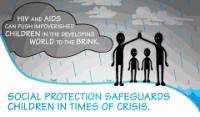
The Unite for Children, Unite against AIDS campaign has produced a short video on the importance of social protection for children
As leaders convene at the G20 summit in Pittsburgh, the Unite for Children, Unite against AIDS campaign, spearheaded by UNICEF and also supported by UNAIDS among other partners, is encouraging a discussion on the role of social protection for children and families affected by AIDS, families like Margaret Nyambura’s.
Ms Nyambura is nearly 70 and she doing her best to care for her five grandchildren in a small house outside Kenya’s capital Nairobi. Ranging in age from five to 14 years old, the children have lost their parents to AIDS-related illness. Making ends meet is a daily battle for Margaret, who does not have a job. Her family is close to destitution and can barely cover expenses for food, shelter and education. She is faced with competing priorities and few resources to deal with them.

Maureen Sakala lives in Lusaka, Zambia, with her mother, siblings and twelve orphaned children, including those of a brother who died of AIDS-related illness. Such families can benefit from increased social protection. Credit: UNICEF/NYHQ2009-0309/Nesbitt
Such a situation is common among impoverished families living in countries hard hit by AIDS. The epidemic can compound poverty when HIV-related needs are pitted against everyday needs, such as food, and long- term investments like education. It can pressure children into becoming breadwinners and caregivers before their time.
Evidence suggests that the current global financial crisis is exacerbating an already precarious situation for these families, who take on approximately 90% of the cost of caring for infected and affected children. There are a growing number of ‘Margarets’. The World Bank has already highlighted a decline in economic growth in the poorest nations and predicts a drop in the remittances workers send home to their families this year.
The economic crisis has come on top of the existing food and AIDS crises that have already stretched families to the breaking point
Dr Rachel Yates, Senior Adviser on Children and HIV at UNICEF
UNICEF contends that the economic crisis makes the needs of the millions of children affected by HIV worldwide even more urgent. As Dr Rachel Yates, Senior Adviser on Children and HIV at UNICEF maintains, “the economic crisis has come on top of the existing food and AIDS crises that have already stretched families to the breaking point.” The situation also threatens to undermine children’s fundamental rights to health, survival and a decent standard of living.
As reported in a recent statement from UNICEF and a number of partners, social protection utilizes an array of actions to tackle vulnerability and exclusion. This form of protection enables countries to provide a range of options for safeguarding their most impoverished families against the impact of big, adverse events like a global recession or chronic illness. When it is tailored to the needs of children, this approach is known as ‘child-sensitive social protection’.
As described by Yates, "child-sensitive social protection including cash transfers and family support services has shown to be an effective way of protecting families and children in times of greatest need, including children worst affected by the AIDS epidemic."
Social transfers such as cash payments, pensions, and food stamps can put resources directly into the hands of those who need them most, and are one key component of social protection. For example, Britain’s Department for International Development has been working with UNICEF and the Kenyan government to arrange cash payments for Margaret and her grandchildren, and others like them.
But, as the joint statement also notes, poor and AIDS-affected families require help beyond social transfers alone, and a raft of diverse interventions, ranging from improved social services to supportive policies and laws, and from tackling stigma and discrimination to ensuring that children have the birth certificates they need to go to school, should also be available.
There is an increasing political consensus that strong social protection systems are required to buffer families and communities against the predations of poverty, lack of opportunity and vulnerability to the effects of AIDS. In April 2009, the G20 backed this approach. African Union leaders have also given their support.
The Unite for Children, Unite against AIDS campaign is calling on leaders at the Pittsburg summit to build on its earlier commitment to social protection -- and to make children a key part of it. It is hoped that world leaders come together to help children and their families and carers in developing countries cope with both the global economic crisis and the AIDS epidemic.
For Chris Desmond of the Harvard School of Public Health and a leading member of the Joint Learning Initiative for Children and AIDS (JLICA), of which UNICEF and UNAIDS are partners, social protection in hard economic times is not a luxury but a necessity:
“There’s always a benefit to social protection. [It] is in many ways an investment in the future of a country… We need those resources, we need those human resources. We shouldn’t see social protection in a negative sense, where we’re providing some sort of charitable relief to people. We’re protecting the assets of our society – human resources are the fundamental assets of our society.”
Social protection: helping families affected by H
Cosponsors:
Partners:
Unite for Children, Unite against AIDS
Joint Learning Initiative on Children and HIV/AIDS (JLICA), an independent alliance of researchers, implementers, policy-makers, activists and people living with HIV
United for UNICEF
Multimedia:
Child-sensitive social protection can lift children out of poverty
Feature stories:
UN Report: Echoing ’97 Asian turmoil, current financial crisis leaves migrants more vulnerable to HIV (12 august 2009)
Global economic crisis and HIV (06 July 2009)
Economic crisis challenges UN health Goals (16 June 2009)
Top UN officials urge continued AIDS funding amid economic crisis (16 June 2009)
Third stocktaking report on children and AIDS (01 December 2008)
Publications:
Children and AIDS: Third stocktaking report, 2008 (pdf, 2 Mb)
Children and AIDS: Third stocktaking report, 2008, Summary (pdf, 2.8 Mb.)
Related
 “Who will protect our young people?”
“Who will protect our young people?”

02 June 2025

Feature Story
Government of Australia, UNAIDS sign partnership agreement
23 September 2009
23 September 2009 23 September 2009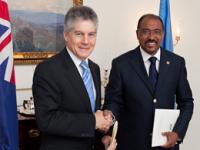
The partnership agreement was signed by Australian Foreign Minister Stephen Smith and UNAIDS Executive Director, Michel Sidibé, on the eve of the opening of the UN General Assembly in New York, 21 September 2009. Credit: UNAIDS/Brad Hamilton
As a sign of consistent and growing partnership on the AIDS response, UNAIDS signed a multi-annual agreement with the Government of Australia on Monday 21 September 2009.
The agreement includes shared goals and objectives for the cooperation between UNAIDS and Australia in the Asia-Pacific region and includes funding of AUD 25.5 million (approximately USD 22 million) over three years. A commitment for increasing funds to UNAIDS by 16.8 per cent from 2010 is also provided for in the agreement.
The agreement was signed by Australian Foreign Minister Stephen Smith and UNAIDS Executive Director, Michel Sidibé, on the eve of the opening of the UN General Assembly in New York.
Predictable funding and continuous engagement are of particular importance to the AIDS response in these difficult financial times to ensure that previous gains on AIDS are not reversed.
Michel Sidibé, UNAIDS Executive Director
“The agreement represents the growing cooperation we have with the Australian Government. We are grateful for Australia’s long-term commitment to HIV and its leadership on AIDS in the Asia-Pacific region,” Mr Sidibé stated during the meeting which took place in New York. “Predictable funding and continuous engagement are of particular importance to the AIDS response in these difficult financial times to ensure that previous gains on AIDS are not reversed.”
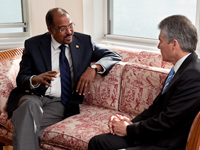
The agreement includes shared goals and objectives for the cooperation between UNAIDS and Australia in the Asia Pacific region and includes funding of AUD 25.5 million (approximately USD 22 million) over three years. Credit: UNAIDS/Brad Hamilton
According to Stephen Smith the partnership with UNAIDS is of great value to the Australian Government who is particularly concerned about countries heavily affected by HIV in the Asia Pacific region. Australia’s Foreign Minister also looked forward to his country’s continued and growing collaboration with UNAIDS in supporting national AIDS responses, for example in Papua New Guinea.
The Australian Government’s overseas aid programme AusAID launched a new international HIV strategy earlier this year. “Intensifying the response: Halting the spread of HIV” was released in April setting priorities that will guide Australia’s international development assistance to tackle the epidemic in the Asia-Pacific region. These priorities include increased and better targeted HIV prevention activities, particularly in high-risk groups; the integration of HIV prevention, treatment and care services into primary healthcare facilities; improved capacity to fund and deliver services; and a review and improvement in laws and policies to ensure people know their HIV status, receive treatment, and can access condoms and clean needles.
Government of Australia, UNAIDS sign partnership
External links:

Feature Story
Bruni-Sarkozy endorses UNAIDS call to virtually eliminate mother-to-child HIV transmission by 2015
23 September 2009
23 September 2009 23 September 2009
(from left) Nicolas Sarkozy President of France; Carla Bruni-Sarkozy, First Lady of France and Global fund Ambassador for the Protection of Mothers and Children against HIV/AIDS; Executive Director of the Global Fund, Michel Kazatchkine; Michel Sidibé, Executive Director of UNAIDS. Credit: UNAIDS/B. Hamilton
Carla Bruni-Sarkozy echoed UNAIDS call to virtually eliminate mother-to-child HIV transmission by 2015 while addressing the UN Secretary General Ban Ki-moon and leaders at a side event to the opening of the United Nations General Assembly in New York. The President of Burkina Faso Mr Blaise Compaoré and the Prime Minister of Ethiopia Mr Meles Zenawi co-chaired the event.
Isn’t it an immense injustice, that thousands of children still are born with HIV, when treatment exists, when no baby needs to be born with HIV?
Carla Bruni-Sarkozy, First Lady of France and the Global Fund’s Ambassador for the protection of mothers and children against AIDS
“Around the world only a third of women living with HIV receive the necessary treatment to prevent the transmission. Isn’t it an immense injustice, that thousands of children still are born with HIV, when treatment exists, when no baby needs to be born with HIV?” asked the First Lady of France and the Global Fund’s Ambassador for the protection of mothers and children against AIDS. Ms Bruni-Sarkozy called on global leaders to double the number of HIV-positive pregnant women who receive effective antiretroviral treatment within 18 months.
UN Secretary-General Ban Ki-moon called for a more ambitious approach: “We have effective drugs. There is no reason why any mother should die of AIDS. There is no cause for any child to be born with HIV,” he said. “If we work hard enough we can virtually eliminate mother-to-child transmission.”
 (Front row of panel from left): Christina Rodriguez, community member; Carla Bruni-Sarkozy, First Lady of France and the Global Fund’s Ambassador for the protection of mothers and children against AIDS, UN Secretary-General Ban Ki-moon
(Front row of panel from left): Christina Rodriguez, community member; Carla Bruni-Sarkozy, First Lady of France and the Global Fund’s Ambassador for the protection of mothers and children against AIDS, UN Secretary-General Ban Ki-moon Credit: UNAIDS/B. Hamilton
Community member Christina Rodriguez, 17 years-old, from New York called for access to services for young people, and shared a moving personal testimony from Keren Gonzalez, 13 years-old, from Honduras, who could not attend the meeting. Morolake Odetoyinbo from Nigeria highlighted the importance of provinding treatment, care and support for mothers living with HIV so that they can stay alive and take care of their children, and called for urgent leadership to deliver on this life-saving commitment.
Other leaders participated in the event including President Sarkozy of France, President Abdoulaye Wade of Senegal, Prime Minister Balkenende of the Netherlands, as well as First Ladies of several countries.
Countries will work with the Global Fund, UNAIDS and UNICEF support to ensure rapid scale-up of programmes to prevent transmission of HIV from mothers to children. The Global Fund will support the switch from single-dose Nevirapine to more effective dual and triple therapy regimens in the next 18 months. More emphasis and funds will be applied to comprehensive programmes addressing reproductive health and the strengthening of maternal and child health services.
Executive Director Michel Sidibé UNAIDS has made the prevention of mothers from dying and babies from becoming infected with HIV a priority and it is one of the nine priority areas in the UNAIDS Outcome Framework 2009-2011.
Bruni-Sarkozy endorses UNAIDS call to virtually e
Cosponsors:
Partners:
The Global Fund to Fight AIDS, TB and Malaria
Feature stories:
UNAIDS/Millennium Villages Project join forces to keep babies free from HIV in Africa (21 September 2009)
Deputy President of South Africa echoes UNAIDS priorities at international AIDS conference (20 july 2009)
Lesotho: HIV free babies bring hope (16 July 2009)
Press centre:
UNAIDS/Millennium Villages Project join forces to keep babies free from HIV in Africa (21 September 2009)
UNAIDS calls for a virtual elimination of mother to child transmission of HIV by 2015 (21 May 2009)
Statements:
Remarks by UN Secretary-General Ban Ki-moon at "A call to action: Protecting mothers and children against AIDS" United Nations, New York, Wednesday 23 September.
Speech by Carla Bruni-Sarkozy "A call to action: Protecting mothers and children against AIDS". United Nations, New York, Wednesday 23 September.
Statement from Keren Dunaway Gonzalez, 13 years old, Honduras. Read by Christina Rodriguez in New York, 23 September 2009.
Publications:
Joint action for results: UNAIDS outcome framework, 2009 – 2011 (pdf, 432 Kb.)

Feature Story
AIDS and security: new evidence, new actions
22 September 2009
22 September 2009 22 September 2009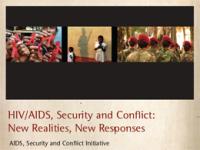
A report published today by the AIDS, Security and Conflict Initiative (ASCI) provides new evidence and outlines recommendation for actions on the links between security, conflict, peacebuilding and HIV.
The report entitled HIV/AIDS, Security and Conflict: New Realities, New Responses is the result of a three year research programme lead by the ASCI. It brings together and summarizes findings from 29 studies using a variety of different qualitative and quantitative research approaches; the programme engaged research partners in 17 different countries. The studies cover four thematic areas: HIV and fragile states, uniformed services, humanitarian crisis and post-conflict transitions, and cross-cutting issues such as gender, data collection and measurement – as such the report provides key evidence for policy-making.
New approaches needed
Demonstrating the impact HIV has on security, the ASCI report outlines how security crises and security institutions can influence HIV incidence. Importantly, the study indicates that with good policy and appropriate programmes, challenges can be overcome. It recommends 10 ways in which efforts towards peacekeeping, peacebuilding and humanitarian response can integrate HIV issues. These include:
- Greater attention to the links between violence against women, forced sex, and reaching out to people who control sex workers and sex trafficking.
- Address the gap in HIV services which can appear in the time between relief and development programmes. This can be addressed if HIV prevention, care, treatment and support are integrated into disarmament and demobilization efforts.
- Create awareness on how criminalization of injecting drug use, sex work and men who have sex with men alienate populations at higher risk making them harder to reach with HIV prevention and other health services.
- Explore the possible advantages of a “Command Centered Approach” by placing responsibility for AIDS policy at the highest level of command within the military to allow for armies to achieve both the highest level of effectiveness and best practices in HIV prevention, treatment and care.
Aligning efforts to prevent HIV
Commenting on the new report, Mr Michel Sidibé, UNAIDS Executive Director, said: “these findings underscore the importance of aligning efforts to prevent sexual violence, and HIV prevention – these connections have yet to be well established within the global context of HIV prevention, treatment, care and support.” The UNAIDS Outcome Framework 2009-2011 includes as two of its nine priority areas stopping violence against women and girls as well as removing punitive laws, practices, stigma and discrimination that block an effective response to AIDS.
AIDS, Security and Conflict Initiative (ASCI)
ASCI is a joint global research initiative between the Social Science Research Council (New York) and Clingendael Institute for International Relations (the Hague), with the aim of informing policy and programming through strengthening the evidence base and addressing critical gaps in knowledge on AIDS and security.
AIDS and security: new evidence, new actions
Press centre:
AIDS and security: New and different threats
External links:
AIDS, Security & Conflict Research Hub
The Social Science Research Council
Clingendael Institute for International Relations
Publications:
HIV/AIDS, Security and Conflict: New Realities, New Responses: Executive Summary | Full Report
Guidelines for HIV/AIDS interventions in emergency settings (pdf. 3.24 Mb.)
Trainer's Guide (1st Edition): IASC Workshop on HIV/AIDS Interventions in Emergency Settings (pdf, 821 Kb.)
Report of the UNAIDS Expert Panel on HIV Testing in United Nations Peacekeeping Operations (pdf. 107 Kb.)
Joint action for results: UNAIDS outcome framework, 2009 – 2011 (pdf, 396 Kb.)
Related

Feature Story
Friends of UN Plus in Swaziland, Mozambique
21 September 2009
21 September 2009 21 September 2009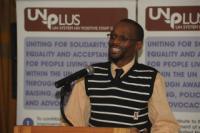
President of Swaziland AIDS Support Organization (SASO) Mr. Vusi Matgerula addressing the event on behalf of the people living with HIV movement in Swaziland. Credit: UNAIDS/G.Williams
Strengthening efforts towards a stigma-free work environment for United Nations staff living with HIV and their families, UN Plus has launched a new Friends of UN Plus initiative in Swaziland. Keeping up the momentum to break down barriers and silence around HIV in southern Africa, this will be followed by the launch of a similar initiative in Mozambique on September 23.
Friends of UN Plus is a novel initiative by UN Plus, an advocacy and support group comprising staff members who are living with HIV. UN Plus membership in the southern African region has doubled in the last year but many staff members living with HIV still feel fearful of disclosing their status. Although UN Plus has a non-disclosure policy, the reluctance to disclose HIV status reflects high stigma levels in society. The Friends initiative, therefore, is meant to provide a supportive environment to those who have reservations about being openly associated with UN Plus. It aims to be a forum through which the needs of HIV-positive staff and those caring for HIV-positive friends and family can be articulated and addressed.
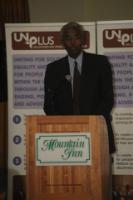
Dr. Jama Gulaid, UNICEF Representative and UN HIV/AIDS Theme Group chair for Swaziland addressing the launch of Friends of UN+ in Mbabane, Swaziland on 17 September 2009. Credit: UNAIDS/G.Williams
''Today was a bold and decisive step we took for us to launch this initiative. I am so glad that staff will now have a platform to share safely and a space for outreach. It does not hurt to help and to reach out. We can all do something to make life better for those in our families, offices and communities living with HIV," said an HIV positive staff member of the UN in Swaziland.
The country launches are designed to highlight workplace rights and continue the ongoing dialogue on human rights, treatment needs and challenges of people living with HIV. Through training, meetings, treatment literacy sessions and related activities the initiative aims to educate staff members about UN Plus’ contribution towards reduction of stigma and discrimination, promotion of social acceptance and increase of social, legal and leadership commitment for HIV at the UN system workplace.

Group photo of participants at the launch of Friends of UN Plus in Mbabane, Swaziland on 17 September 2009. Credit: UNAIDS/G.Williams
The Swaziland launch included a panel discussion where representatives of people living with HIV answered questions from the local press on issues of equality and rights. Two members of the local media joined the panel to share their experiences of how they cover stories of people living with HIV in a meaningful way.
Friends of UN Plus will operate in tandem with UN Cares, the UN HIV in the workplace programme, the UN Wellness Program and other workplace initiatives and agency-specific programmes that exist at country levels.
Friends of UN Plus in Swaziland, Mozambique
Partners:
Feature stories:
New UN Plus groups in South Africa and Lesotho (16 September 2009)
UN Secretary-General meets HIV positive UN staff members (20 May 2009)
UN Secretary-General opens UNPlus exhibition (01 December 2007)
Multimedia:
UN Plus meets UN Secretary-General at UN Headquarters in New York: photo gallery (20 May 2009)
External links:
Unplus on Facebook
Unplus on Twitter
UN Cares
Publications:
UN System HIV Workplace Programmes HIV Prevention, Treatment and Care for UN System Employees and Their Families (pdf, 1.48 Mb.)

Feature Story
UNAIDS, Millennium Villages join forces to keep children free from HIV in Africa
21 September 2009
21 September 2009 21 September 2009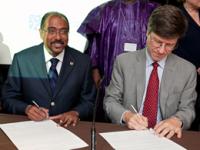
UNAIDS Executive Director Michel Sidibé and Prof. Jeffrey Sachs, Director of the Earth Institute, signing the agreement. 21st September, New York.
Credit: UNAIDS/B.Hamilton
UNAIDS and the Millennium Villages Project signed an agreement in New York to strengthen efforts to eliminate mother-to-child transmission of HIV in Africa. The aim of the partnership is to help local governments create “Mother to child transmission-free zones” in 14 ‘Millennium Villages’ across ten African countries.
The Millennium Villages Project, a partnership between The Earth Institute at Columbia University, Millennium Promise, and UNDP, seeks to end poverty by working in rural areas throughout Africa. The new initiative will use the existing infrastructure, human capacity and technical resources in the villages, to help rapidly expand family- and community-centered heath services with focus on stopping new HIV infections among children.
UNAIDS Executive Director Michel Sidibé and Prof. Jeffrey Sachs, Director of the Earth Institute, signed the agreement in the presence of business and African leaders. The ceremony was held under the auspices of President Yoweri Museveni of Uganda and President Abdoulaye Wade of Senegal.
“I salute this partnership to help protect mothers and their children from HIV. This initiative will mobilize resources and generate political will to save young lives, leading to a generation of African children born free of HIV,” said President Wade.
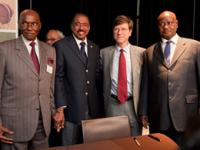
(L to R): President Abdoulaye Wade of Senegal, UNAIDS Executive Director Michel Sidibé, Prof. Jeffrey Sachs, Director of the Earth Institute and President Yoweri Museveni of Uganda.
Credit: UNAIDS/B.Hamilton
Also speaking at the ceremony were Dr Lydia Mungherera, a Ugandan HIV prevention activist representing the organizations HIV+ and TASO. The Executive Director of UNICEF, Ms Ann M. Veneman, the Minister of State of Mali, Mr. Abou Sow; the South African Minister of Health Dr. Aaron Motsoaledi; and Ambassador Eric Goosby, MD, the United States Global AIDS Coordinator participated in a panel discussion at the event.
Each day 1,200 children under the age of 15 are infected with HIV; 90% of these infections occur in sub-Saharan Africa. According to Mr. Sidibe, “In all of Western Europe there were fewer than 100 mother-to-child transmissions (MTCT) in 2007, whereas in sub-Saharan Africa, there were more than 370,000.”
The top priorities outlined in the memorandum include measures to ensure that women of child bearing age avoid getting infected, those that are infected avoid unwanted pregnancy; increase access to antenatal care services; HIV testing and counselling to expectant mothers; and expanded access to HIV prevention and treatment services for children.
The agreement will bring together the Millennium Village Project’s multi-sectoral and science-based development and primary healthcare strategy with UNAIDS’ expertise in community and family-centred prevention strategies in order to create ‘MTCT-free zones’, whose progress will be monitored by both entities.

Executive Director of UNICEF, Ms Ann M. Veneman, South African Minister of Health, Dr. Aaron Motsoaledi, and UNAIDS Executive Director Michel Sidibé.
Credit: UNAIDS/B.Hamilton
“We hope that the creation of ‘MTCT-free zones’ in the Millennium Villages will serve as a model that can be used throughout Africa whereby communities are engaged, men and young people are active partners, and children are born free from HIV,” Mr Sidibé said.
In 2007, there were 2 million children under 15 years living with HIV, up from 1.6 million in 2001 and less than 15% in need of treatment were getting it. In sub-Saharan Africa, only a third of pregnant HIV-positive women received the antiretroviral treatment (ART) to prevent transmitting the infection to their infants, compared with nearly 100% in Western Europe.
Operating in 14 sites in 10 sub-Saharan African countries, the Millennium Villages project has been working with local governments to introduce a model primary health system which will cover approximately 500,000 people.
The Villages work on a model primary health system and include education, nutrition and economic development. The primary health systems include; free services at the point of care; trained professional community health workers; a network of adequately staffed primary clinics; access to a mobile communication network and emergency transport services to facilitate referrals; and a local referral hospital to support second-tier care. The system houses a monitoring and evaluation platform that can readily assess the adequacy, uptake and impact of HIV testing and counselling and family centered HIV prevention services.
UNAIDS, Millennium Villages join forces to keep c
Cosponsors:
Partners:
Feature stories:
Deputy President of South Africa echoes UNAIDS priorities at international AIDS conference (20 july 2009)
Lesotho: HIV free babies bring hope (16 July 2009)
Press centre:
UNAIDS calls for a virtual elimination of mother to child transmission of HIV by 2015 (21 May 2009)
Development leaders point to significant progress in mother and child health and reduction of malaria and AIDS deaths in poorest nations (23 September 2008)
Publications:
Prevention of HIV Transmission from Mother to Child (pdf, 222 Kb.)
Related

Feature Story
Metro TeenAIDS – keeping young people on the agenda in Washington DC
18 September 2009
18 September 2009 18 September 2009
UNAIDS Executive Director Michel Sidibé met with Metro TeenAIDS (MTA), a community health organization in Washington, DC dedicated to supporting young people to overcome the impact of AIDS. Credit: UNAIDS/Jati Lindsay
UNAIDS Executive Director Michel Sidibé met yesterday with Metro TeenAIDS (MTA), a community health organization in Washington, DC dedicated to supporting young people to overcome the impact of AIDS.
Currently, 1% of young people ages 13-24 in Washington, DC are confirmed to be living with HIV.
Metro TeenAIDS is the leading youth organization in the Washington DC-metro area focusing all its efforts on the prevention, education, treatment and the unique needs of young people around HIV. Its mission is to prevent the spread of HIV, promote responsible decision making and improve the quality of life for young people living with or affected by HIV. Metro TeenAIDS also provides HIV counseling and testing services to young people. In the last three months alone, over six hundred youth have been tested at MTA.
During his visit, Mr Sidibé met with Mr. Adam Tenner, Executive Director of Metro TeenAIDS, Metro TeenAIDS staff, as well as some of its youth staff who work as peer-educators. Metro TeenAIDS staff gave Michel Sidibé a tour of the facilities, including its youth center Freestyle which is currently being renovated, and took part in a lively roundtable discussion on HIV prevention with youth.
Together, they discussed MTA’s innovative programming, varying from youth leadership and advocacy, text messaging, internet outreach, and other new media social marketing campaigns. One member of the staff, Carmel Pryor, discussed REALtalk DC, a social marketing campaign that has been extremely successful in the District and includes a texting service for free testing information and HIV education.
Some youth and staff had recently traveled to South Africa on a work trip and discussed their experiences. “South Africa looks a lot different from DC, but it’s really, really the same in terms of the scope of the issues and how it affects community” said Nicole Styles, Outreach Coordinator.

During his visit, Mr Sidibé met with Mr Adam Tenner, Executive Director of Metro TeenAIDS, as well as peer-educators working in the program and with youth benefiting from their services. Credit: UNAIDS/Jati Lindsay
With Washington DC having the highest HIV prevalence of any city in the US, at a striking ten times the national average, Mr Sidibé underlined the importance of the work undertaken by Metro TeenAIDS to expand access to youth-friendly health services. “Young people are our window of opportunity. What do we do to accompany them to stay HIV free?” asked Mr. Sidibe.
“The HIV epidemic in the U.S. is part of the global AIDS response” said Mr Sidibé highlighting the fact that young people aged 15-24 account for 45% of new infections worldwide. One of the key priority areas in the UNAIDS outcome framework is empowering young people, and Mr. Sidibé reaffirmed UNAIDS’ commitment to genuine participation of youth in expanding international response to HIV.
Established in 1988, the Metro TeenAIDS has provided education programs and prevention resources to over 200 000 young people, affected family members as well as youth workers in Washington, Maryland and Virginia.
Metro TeenAIDS – keeping young people on the agen
Feature stories:
Michel Sidibé presents UNAIDS’ vision in Washington, D.C. (14 September 2009)
UNAIDS Forum on HIV, Human Rights and Men Who Have Sex with Men (17 September 2009)
External links:
Metro TeenAIDS (MTA)
Publications:
Joint action for results: UNAIDS outcome framework, 2009 – 2011(pdf, 396 Kb.)
Related
 “Who will protect our young people?”
“Who will protect our young people?”

02 June 2025



